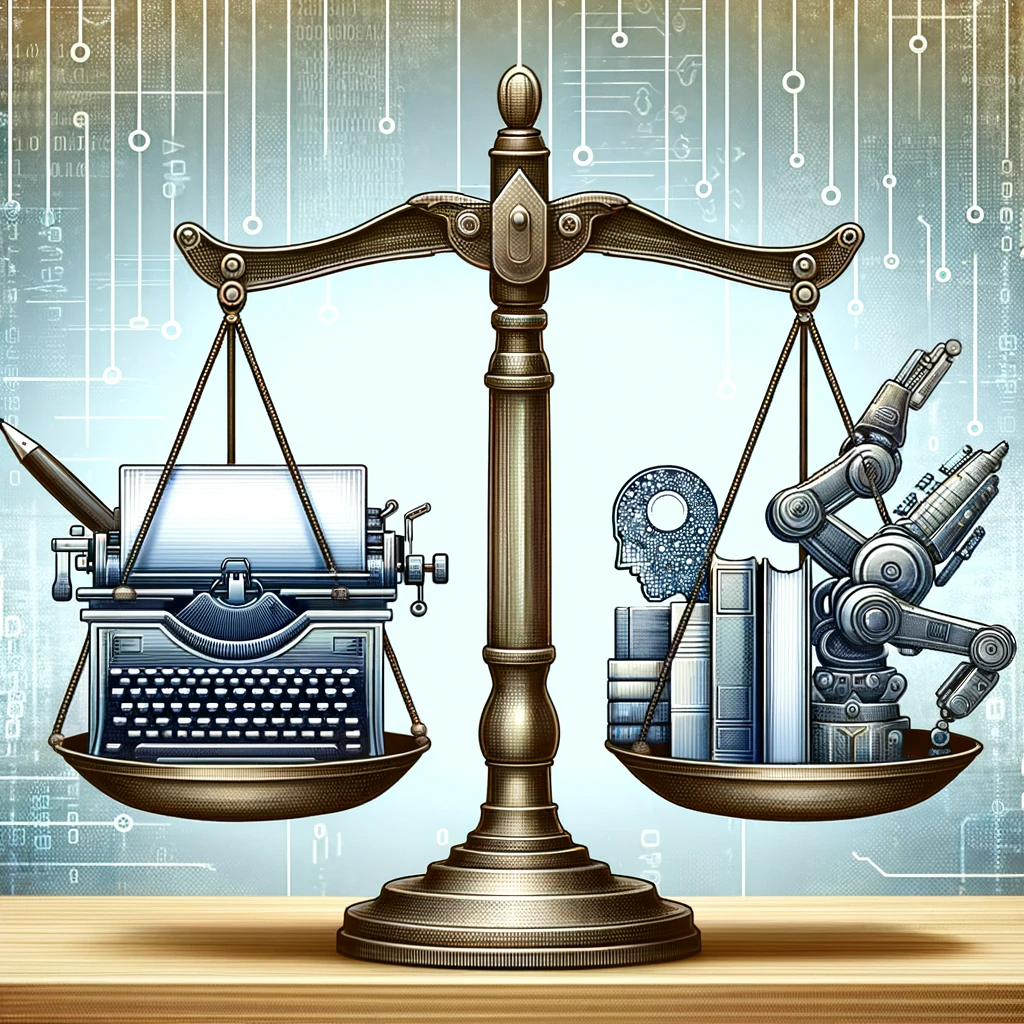In the rapidly evolving world of content creation and publishing, Artificial Intelligence (AI) has emerged as a game-changing force. AI writing tools and AI publishing platforms, equipped with the ability to mimic human-like writing and ideation, have revolutionized how content is produced, offering new levels of efficiency and innovation.
These platforms are capable of everything from generating blog posts to drafting detailed reports, showcasing the far-reaching influence of AI in this domain. Despite these remarkable capabilities, AI publishing platforms are not without their limitations and challenges. Herein lies the focus of this article: exploring the Limitations of AI publishing platforms and offering a balanced view.
This article seeks to provide a balanced view of these limitations, delving into the nuances of AI’s impact on content quality, creativity, and ethical implications.
Overview of Current AI Publishing Platforms
In recent years, a variety of AI publishing platforms have emerged, each offering unique capabilities in content generation.
AI writing tools, such as OpenAI’s GPT-3, Jasper, and Writesonic, have become increasingly popular among content creators for their ability to produce written material at an unprecedented scale and speed.
They leverage sophisticated algorithms to analyze existing content and generate new pieces that can range from blog posts and social media content to more complex reports and articles.
AI writing tools are celebrated for their efficiency, enabling users to produce large volumes of content in a fraction of the time it would take a human writer.
Your Publishing Journey Awaits – Start NowQuality Concerns
Despite their advanced capabilities, AI writing tools often struggle with maintaining the quality of the content they generate. One of the most significant issues is the lack of depth and nuance in AI-generated content.
While AI writing tools can efficiently aggregate and rephrase existing information, it typically falls short in creating well-researched and insightful content.
This shortfall is particularly evident in topics that require in-depth knowledge or a nuanced understanding of the subject matter.
Additionally, content generated by AI writing tools can sometimes be repetitive or overly simplistic, lacking the richness and complexity of human-written prose.
Creativity and Originality Issues
Creativity and originality are fundamental aspects of quality writing, yet they remain significant challenges for AI. AI writing tools tend to rely heavily on existing data to generate content, leading to outputs that are often derivative or lacking in original thought.
This is a major limitation in creative fields like fiction writing, poetry, or opinion pieces, where the uniqueness and personal touch of the content are paramount.
The current state of the technology used for AI writing tools struggles to replicate the spontaneous and imaginative aspects of human creativity, which are crucial for truly original and engaging writing.
Context Understanding and Tone
Another area where AI writing tools often falter is in understanding context and appropriately delivering the intended tone. An AI writing tool can misinterpret nuances, cultural references, or complex concepts, leading to content that may be factually correct but contextually inappropriate or tone-deaf.
This limitation becomes particularly problematic in sensitive subjects or content that requires empathy, humor, or subtlety.
AI writing tools are not yet adept at picking up on these finer aspects of human communication, making it challenging for them to match the depth and emotional intelligence of content written by experienced human authors.
While AI tools offer remarkable efficiencies in content generation, they face significant challenges in ensuring the quality, creativity, originality, and contextual appropriateness of the content they produce.
These limitations highlight the current gap between AI capabilities and the nuanced, creative, and empathetic aspects of human writing.
AI Tools in the Writing Process
Role in Research and Data Analysis
AI tools have become invaluable in the realm of research and data analysis, especially in the writing process. They can sift through vast amounts of data, identify trends, and extract relevant information much faster than a human can.
This capability is particularly beneficial for writers who need to incorporate complex data or detailed research into their work.
AI tools can analyze reports, studies, and databases, providing writers with a synthesized overview that can be a starting point for deeper investigation.
This not only saves time but also ensures that the content is grounded in accurate and up-to-date information.
Automating Routine Tasks
AI’s ability to automate routine tasks is another area where it significantly aids with writing. Tasks such as basic data entry, spelling and grammar checks, formatting, and even certain types of research can be handled efficiently by AI tools.
This automation allows human writers to allocate more time and energy to the creative aspects of writing, such as developing narratives, crafting arguments, or engaging in more complex research that an AI writing tool currently cannot perform.
By handling the more mundane aspects of writing, AI enables writers to focus on adding value through creativity and critical thinking.
Integration with Existing Content
However, integrating AI-generated content with existing human-written material presents certain challenges. An AI tool may not always align with the style, tone, or depth of human-written content, leading to a disjointed or inconsistent final product.
Content generated by an AI tool might lack the nuanced understanding or the subjective insights that come naturally to human writers.
Consequently, blending the two seamlessly often requires significant editing and revision to ensure coherence and maintain the quality of the combined content.
Your Publishing Journey Awaits – Start NowAI Generated Content and Its Impact
As we venture into understanding the wider implications of AI in the realm of content creation, it becomes crucial to examine the impact of AI-generated content.
This aspect of AI integration is not just about the efficiency of content production, but also about how this content interacts with and influences the digital ecosystem, including search engines, reader engagement, and the broader ethical landscape.
The following sections will delve into these critical areas, shedding light on both the advantages and the challenges posed by AI-generated content in the modern digital landscape.
Let’s explore the multifaceted impact of AI in content generation and its implications for the future of publishing.
Search Engine Optimization (SEO)
AI-generated content has a significant impact on search engine optimization and online visibility. AI tools are adept at identifying and incorporating keywords to improve SEO rankings.
However, there’s a delicate balance to be struck; over-optimization can lead to content that is dense with keywords but poor in quality, potentially harming a site’s reputation with both readers and search engine algorithms.
The key is using an AI tool to enhance SEO while keeping the content engaging and valuable to the reader.
Reader Engagement and Satisfaction
In terms of reader engagement, AI content often struggles to match the depth and relatability of human-written content. While AI can produce factually accurate and coherent articles, it may lack the emotive and personal touch that resonates with readers on a deeper level.
Human-written content, with its inherent capacity for empathy, storytelling, and personal insights, often engages readers more effectively, fostering a stronger connection and encouraging prolonged interaction with the content.
Ethical Considerations and Misinformation Risks
There are significant ethical considerations and risks of misinformation with AI-generated content. The lack of understanding of context and subtleties can lead to inaccuracies or misrepresentations in AI content.
Moreover, the ease with which AI can generate content can be exploited to produce misleading or biased information at scale, raising concerns about the propagation of misinformation.
It is crucial for platforms using AI for content creation to implement rigorous checks and balances to maintain the integrity and accuracy of the information being disseminated.
The Future of Artificial Intelligence in Publishing
Evolving AI Technologies
The landscape of AI in publishing is continuously evolving, with newer technologies showing promise in addressing some of the current limitations. Advancements in natural language processing and machine learning are leading to more sophisticated AI writing tools that can better mimic human writing styles, understand context, and generate more creative and nuanced content.
Future applications may see AI not only assisting with writing, but also in personalized content curation, dynamic content adaptation based on reader feedback, and more interactive and immersive reading experiences.
Your Publishing Journey Awaits – Start NowThe Role of Human Writers in an AI-Driven World
As AI continues to advance, the role of human writers is expected to evolve rather than diminish. Human writers will likely shift towards tasks that require deep creativity, empathy, and subjective judgment—areas where AI still lags.
The human touch in storytelling, opinion pieces, and subjects requiring ethical considerations will remain irreplaceable. Writers might also increasingly take on roles as AI supervisors, ensuring that the content produced aligns with ethical standards and maintains a high quality.
Balancing AI and Human Creativity
The future of publishing lies in finding the right balance between AI and human creativity. AI can augment human capabilities, handling data-driven and routine tasks, thereby freeing writers to focus on creative and complex aspects of writing.
This synergy can lead to optimal content generation, combining AI’s efficiency and data-processing capabilities with the creative and empathetic strengths of human writers. The key is to leverage the best of both worlds, harnessing AI’s potential while cherishing and nurturing the unique qualities of human writing.
The limitations of AI publishing platforms – Final Words
The integration of AI in publishing and content creation marks a significant milestone in the evolution of writing. While AI tools bring undeniable efficiencies in research, data analysis, and automating routine tasks, their limitations in terms of creativity, originality, and understanding context highlight the indispensable value of human insight in writing.
The impact of AI-generated content on search engine optimization, reader engagement, and the broader ethical landscape emphasizes the need for a careful balance between technological innovation and human oversight.
Looking ahead, the future of AI in publishing is poised for further advancement, with evolving technologies promising to bridge some of the current gaps. However, the role of human writers remains crucial, evolving in tandem with AI advancements to focus more on creative, empathetic, and ethical aspects of content creation.
Ultimately, the synergy between AI’s analytical prowess and the nuanced creativity of human writers appears to be the most promising path forward. This balanced approach can harness the strengths of both AI and human skills, leading to a richer, more diverse, and ethically grounded landscape in the world of publishing and content creation.







